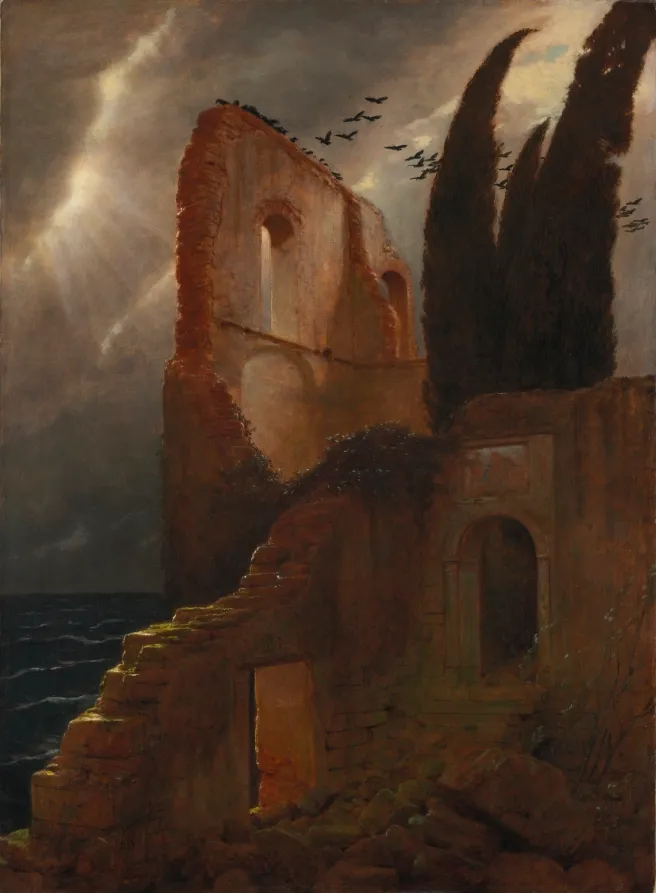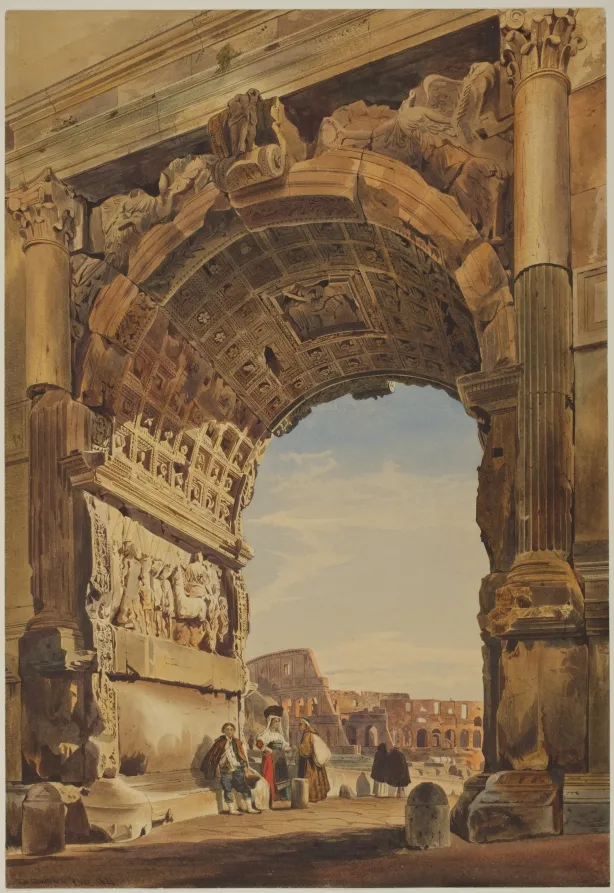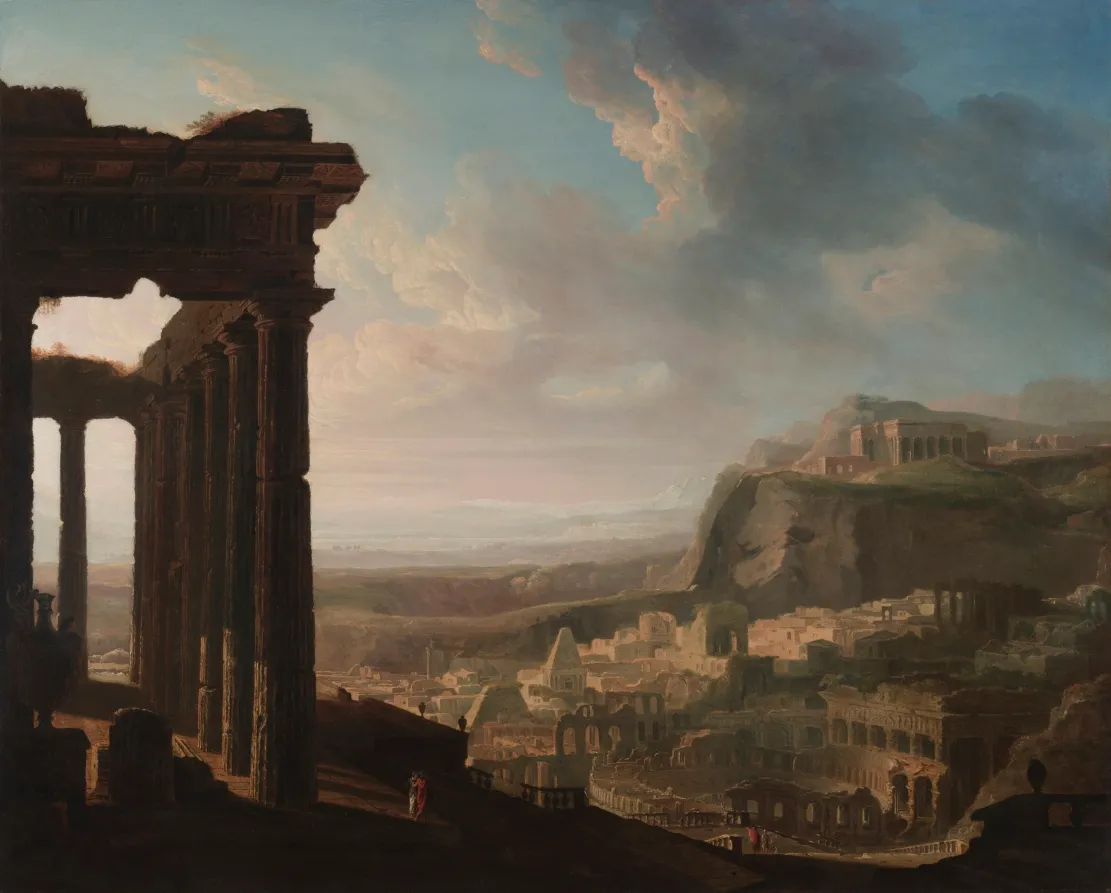A Form of Transcendent Mysticism (S2E6)
Last updated: 7/17/2024 | Originally published: 9/14/2020
Apologies, this will once again be a short issue—pages don’t write themselves, and seeing as how we’re halfway through my (self-declared) NaSepWriMo, I just hit 22k words, which is just about on track. That said, I do have some small musings to share this week.
 “Ruin by the Sea”, Arnold Böcklin, 1881
“Ruin by the Sea”, Arnold Böcklin, 1881
Table of Contents
Open Table of Contents
Modernism as Global Monoculture
We frequently talk of “Westernization”, but it may be more profitable to speak of global “modernization”, as a package of related cultural norms and practices (started in, but not exclusively spread by, the “West”) that swept across the world (in a cultural evolution sense) throughout the nineteenth and twentieth centuries.
Interestingly, I don’t think this package of cultural features includes some things that most people would assume. For instance, I don’t think secularization is a necessary part of modernization—or, at least, Mormons seem a counterexample. So what kind of cultural practices might be included?
- Relatively widespread, if not universal, literacy
- An emphasis on monogamy (concubinage and polygamy are largely foreign to modernity, even in societies—even in Europe!—that once had them) and binary gender (now being exploded, of course—but it’s interesting to note that many pre-modern societies had gender categories, notably eunuchs, that simply don’t exist anymore)
- Clothing—traditional clothing worldwide seems to be dying out, in favor of a more standardized, globalized style, of suits and pants and the like (interestingly, this isn’t purely a Western imposition—after all, Mao suits are called that for a reason!)
- Modern militaries (the linked piece is incidentally about why chemical weapons are rarely used, but along the way explains the development of modern militaries)
Anyway, I’m not an anthropologist, for whom these kinds of observations are probably old hat, but I thought it was interesting to consider the spread of “modernity” nonetheless.
 “The Arch of Titus and the Coliseum, Rome”, Thomas Hartley Cromek, 1846
“The Arch of Titus and the Coliseum, Rome”, Thomas Hartley Cromek, 1846
Mathematics as Occult Knowledge
Perhaps mathematics is so intriguing because it is the closest to occult knowledge that modernity admits—a labyrinthine system of mystical correspondences, barely grasped by even the most learned of adepts, in whose patterns the workings of the world can distantly be glimpsed. Many other disciplines could be described similarly, but some (physics, say) are not so far removed from our day-to-day humdrum experience and others (some parts of continental philosophy, say) fail to have the unreasonable effectiveness of mathematics. Mathematics is the only modern academic discipline that combines actual, explanatory power with a form of transcendent mysticism.
 “Ruin of a Church”, Rudolf von Al t, 1849
“Ruin of a Church”, Rudolf von Al t, 1849
Chesterton’s Memory Fence
Chesterton’s Fence is an (admittedly rather conservative) principle that one shouldn’t destroy something until they can explain why it’s there. In the original context, it was applied to social reform, but the principle can profitably be applied to programming: do not remove code unless you can explain why it’s there! If you can’t explain why code was there in the first place, you’re likely to introduce a bug.
The “code comments should explain why, not how” principle falls out as a corollary of this: having a comment explaining “why” solves this problem handily. Thus, if you think you (or someone else!) will ever run into Chesterton’s fence, it might be worth adding a comment.
 “Ruined Church”, Adrien Dauzats, c. 1840
“Ruined Church”, Adrien Dauzats, c. 1840
Miscellanea
I watched a movie I liked a lot (Yojimbo, perhaps a shallow film but elegantly-crafted all the same) and two I did not (A Fistful of Dollars, an unofficial remake of Yojimbo from a director with none of Kurosawa’s taste, and Duck Soup, a Marx brothers classic that I found neither particularly funny nor enlightening).
I watched, and found myself taking notes on, the Sacred Texts of the World series from the Great Courses (which, as I’ve mentioned before, are generally quite excellent despite their potato production quality). It’s a surprisingly touching series, and I even experienced a brief moment of transcendence when I looked up the Hindu Gayatri Mantra at the insistence of the host. I highly recommend it for anyone interested in a first course on world religions.
I stumbled through Ovid’s Metamorphoses—smoke does not do wonders for one’s focus—but I am very glad I did; although certain episodes are rather appalling to a modern audience, it’s more than made up by the gentleness of truly charming tales like Baucis and Philemon. More to the point, Ovid’s almost cheeky “eh, that’s life” attitude seems of a mind with Douglas Adams, who of course I am ever so fond of. I also read two shorter ancient works, namely Aristophanes’ Lysistrata and Euripides’ Bacchae (the latter in the Greek Plays collection, which has very strong translations1. Lysistrata continues to be a comedic masterpiece (much stronger than Duck Soup, if I do say so myself) and Bacchae continues to be a dark, strange masterpiece of tragedy.
 “Ruins of an Ancient City”, John Martin, c. 1810 - 1820
“Ruins of an Ancient City”, John Martin, c. 1810 - 1820
Footnotes
-
Notably, the Bacchae is translated by Emily Wilson, who is justly famous for her translation of the Odyssey. ↩